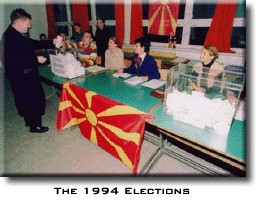PARLIAMENTARY ELECTIONS 1994
1994 is the year of the first general and direct presidential elections and of the second regularly parliamentary elections in Macedonia. Pollsters and political analysts believe that, considering the fact that Macedonian political strategy has been built on realism and moderateness in home and foreign policies, it would be unrealistic to expect radical changes regardless of what party or party block may obtain majority in the Assembly. It is believed that the idea of Macedonia as a country of peace and stability on the domestic plan, in the region, in Europe and in the world has become a predominant asset in political culture.

Macedonia has chosen the European political option. Parliamentary elections are expected to be carried out in that atmosphere. This should be possible given the experience so far in political pluralism and parliamentary democracy.
It was proposed that the Assembly should consist of 140 Representatives instead of present 120. According to the proposal, 120 Representatives were to be elected by the majority principle, and 20 by the proportional one. Yet the draft on changes in the election of Representatives and Municipal Councilors Act failed to gain a majority in the Assembly. IN addition to the Representatives of the opposition, it was rejected by PDP, even though this party is a member of the ruling coalition.
Delegations from the European Parliament and prominent scholars and experts in constitutional law have supported these solutions. But in light of the opposing interests of political parties, there remain two possibilities: either early elections, or regular elections in accordance with the old law.
The first round of the second parliamentary elections in the Republic of Macedonia took place on October 16, along with the presidential elections. Kiro Gligorov, appointed by SDSM, LP and SP and Ljubisa Georgievski, appointed by VMRO-DPMNE were presidential candidates.
About fifty political parties presented 1, 766 candidates for parliament members, while 284 individuals took part in the elections as independent candidates.
The voting process was carried out at about 2,700 polling stations in 120 election districts in 34 municipalities. The total number of voters, registered in the General Voter List was at 1,368,892 (in 1990 - there were 1,339,021 voters). The election campaign lasted for 29 days (46 days in 1990).
Petar Nahdanov was President of the State Election Commission (SEC).
According to SEC, Kiro Gligorov won the presidential elections by 715,774 votes, while his rival Ljubisa Georgievski - 197,210.
Eleven parliament members were elected in the first voting round.
16 political parties and 67 independent candidates were qualified for the second election round, i.e. 389 candidates ran in the second round.
The opposition, comprised of VMRO-DPMNE, MAAK, DP and independent candidate Todor Petrov, at a press conference on October 24, said it would not take part in the second round demanding - annulment of the elections; creation of conditions for conducting of the elections; SEC's resignation; separation of the presidential and parliamentary elections. The demand was refused - the opposition boycotted the second election round.
The coalition Alliance for Macedonia won the elections.
The mandate of 116 parliament members was verified at the first Parliament session, chaired by oldest parliamentarian Aleksandar Ivanovski. Stojan Andov was reelected for Parlaiment Speaker. Tito Petkovski, Abdurahman Aliti and Kiro Popovski were elected for his deputies.
The President gave the mandate to Branko Crvenkovski to assemble a new Government cabinet after the inter-party discussions. The function Minister without Portfolio and Government Spokesman was introduced for the first time.
Government Ministers: Blagoj Handziski - Defence Minister; Ljubomir Frckovski - Minister of Interior; Vlado Popovski - Justice Minister; Stevo Crvenkovski - Foreign Minister; Jane Miljoski - Finance Minister; Bekir Zuta - Minister of Development; Jorgo Sundovski - Minister of Urbanism, Building and Ecology; Dimitar Buzlevski - Traffic and Communication; Ivan Angelovski - Minister of Agriculture; Iljaz Sabriu - Minister of Labor and Social Policy; Emilija Simoska - Minister of Education; Estref Aliu - Minister of Culture; Ilija Filipce - Minister of Health; Sasko Stefkov, Ljube Trpeski and Guner Ismail - Ministers without Portfolio. Guner Ismail was also Government Spokesman.
SDSM had 10 Ministers in the Government, PDP and LP had 4, while SP had 2.